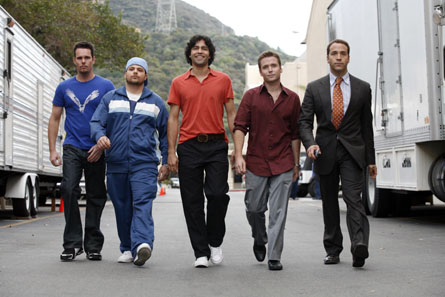Art Scatter friend Whitney Otto has been following Entourage on HBO, part of her ongoing submersion in the television soup for strictly professional reasons. OK, maybe not “strictly” and maybe not “professional” and were not sure that “reason” has anything to do with it, either. Nonetheless, before the final episode this year, she sent us her take on the season — which was a difficult one for Vincent and the boys. Then, she sent us an addendum after Sunday’s finale, which we appended (something about appending an addendum just makes us a little giddy). Mostly, though, we couldn’t be more excited about having her join us!
Oh, Entourage! What happened to the golden days of moving from mansion to mansion, Malibu to Cannes; teeing off from your multimillion dollar roof, playing video games, and watching porn but only until the weed and willing party mates arrive? Where are the luxury cars worth hundreds of thousands of dollars? The endless freebies? The cavorting on movie sets, and the high altitude cavorting on private jets?
In short, when did this show cease to be a guilty pleasure that even a viewer far outside the show’s demographic could love, and turn into something less fanciful, a harsh lesson in what happens when art and commerce collide?
The season began with Vincent Chase living for the last six months on a Mexican beach with one-third of his entourage, Turtle, and an ever revolving cast of temporary “girlfriends.†He had taken refuge from the very public debacle of Medellin, a movie fiasco into which he poured every million he ever made, along with his heart. That movie came on the heels of his greatest triumph starring in the most successful superhero movie of all time, Aquaman.
He’s persuaded to end his sabbatical with the promise of a role her would love to play — the only hitch is that it was never a genuine offer. It was a ploy on the part of the producers to secure the actor they really wanted for the movie. Though Vince handles the humiliation with aplomb, he comes to understand that this little scenario is an indication of where his career is at the moment — that is to say, nowhere.
The reverberations of failure can soon be felt all through his life, right down to the girl he’s always wanted who is now trying to palm him off on her less attractive friend. And an appearance at a financially bloated Sweet 16 party to earn some cash since he is now broke.
At this point in a Hollywood story, things would start looking up for our hero, except this series has become a story about Hollywood, as opposed to a Hollywood Story. In the second to the last episode, what seems to be his last, good chance evaporates as a consequence of ego and studio prerogative. Finally, Vince’s fall really does resemble a fall from grace. Never again will he take his career so lightly; in many cases, the bravest artist is the artist who has never known failure, only success.
Prior to this season, Vince’s career decisions were made according to his artistic vision; he had been blessed with a straight-success trajectory that often made him careless and self-indulgent. The lesson he has learned this season is a hard and true one for any artist: The relationship between art and money is complicated, sometimes unpalatable, and impossible to ignore. And that even when you’re willing to do what you must, you may have the further humiliation of learning that someone must give you that chance, that is, compromising yourself isn’t always your decision.
His final and most surprising discovery was that he loved his art much more than he ever knew, and the heartbreak of that fundamental truth coming when it does is what has moved Entourage from boy fantasy to grown-up fable.
And then in the last episode of the season: Vinnie Chase is back and Martin Scorcese got him! But first, Vince and the boys must travel back to their respective mothers’ houses in Queens (it seems fitting that these lost boys would have Wendys in their lives but no fathers).
Vince learns that Gus Van Sant is casting a movie for which Vince would be willing to read. An established movie star generally doesn’t “read,” but a falling star is another story. In keeping with the rest of the season, Mr. Van Sant says No to Vince’s offer, again underscoring the only thing worse that humbling oneself is being told not to bother.
Then salvation arrives in the form of a phone call from Martin Scorcese (the idea planted by Van Sant) asking Vince to play the part of Nick Carroway in a modern re-imagining of “The Great Gatsby,†a novel that is practically a primer on money, class, and personal reinvention in America. This final installment of the season achieves a nearly perfect fusing of the story of Vincent Chase’s pursuit of his own “green light at the end of the dock†with his casting in a movie that embodies such heady romantic desire.
He finally may have the role he was truly meant to play.
